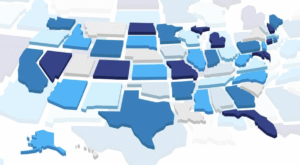Amendments to the Montana Consumer Data Privacy Act Bring Big Changes to Big Sky Country
On May 8, Montana Governor Gianforte signed SB 297, amending the Montana Consumer Data Privacy Act (MCDPA). This amendment was sponsored by Senator Zolnikov, who also championed the underlying law’s enactment in 2023. Much has changed in the state privacy law landscape since the MCDPA was first enacted, and SB 297 incorporates elements of further reaching state laws into the MCDPA while declining to break new ground. For example, SB 297 adopts heightened protections for minors like those in Connecticut and Colorado as well as privacy notice requirements and a narrowed right of access like in Minnesota’s law. The bill does not include an effective date for these new provisions, so by default the amendments should take effect on October 1, 2025.
This blog post highlights the important changes made by SB 297 and some key takeaways about what this means for the comprehensive consumer privacy landscape. Changes to the law include (1) a duty of care with respect to minors, (2) new requirements for processing minors’ personal data, (3) a disclaimer that the law does not require age verification, (4) lowered applicability thresholds and narrowed exemptions, (5) a narrowed right of access that prohibits controllers from disclosing certain sensitive information, (6) expanded privacy notice requirements, and (7) modifications to the law’s enforcement provisions. With these changes, Montana yet again reminds us that privacy remains a bipartisan issue as SB 297, like its underlying law, was passed with overwhelmingly bipartisan votes.
1. New Connecticut- and Colorado-style duty of care with respect to minors.
The biggest changes to the MCDPA concern protections for children and teenagers. Like legislation enacted by Connecticut in 2023 and Colorado in 2024, SB 297 amends the MCDPA to add privacy protections for consumers under the age of 18 (“minors”). These new provisions apply more broadly than the rest of the law, covering entities that conduct business in Montana without any small business exceptions (i.e., there are no numerical applicability thresholds, although the law’s entity-level and data-level exemptions still apply).
Under these new provisions, any controller that offers an online service, product, or feature to a consumer whom the controller actually knows or wilfully disregards is a minor must use “reasonable care” to avoid a “heightened risk of harm to minors” caused by the online service, product, or feature (“online service”). Heightened risk of harm to minors is defined as processing a minor’s personal data in a manner that presents a “reasonably foreseeable risk” of: (a) Unfair or deceptive treatment of, or unlawful disparate impact on, a minor; (b) financial, physical, or reputational injury; (c) unauthorized disclosure of personal data as a result of a security breach (as described in Mont. Code Ann. § 30-14-1704); or (d) intrusion upon the solitude or seclusion or private affairs or concerns of a minor, whether physical or otherwise, that would be offensive to a reasonable person. This definition largely aligns with some of the existing triggers for conducting a data protection assessment under the MCDPA.
At a time when many youth privacy and online safety bills, such as the California Age-Appropriate Design Code (AADC), are mired in litigation over their constitutionality, it is notable that three states—Connecticut, Colorado, and Montana—have now opted for the framework in SB 297. Given that neither Connecticut’s nor Colorado’s laws have been subject to any constitutional challenges as of yet, this approach could be a more constitutionally resilient way than the AADC model to impose a duty of care with respect to minors. Specifically, the duties of care in Connecticut’s, Colorado’s, and now Montana’s laws are rooted in traditional privacy harms and torts (e.g., intrusion upon seclusion) whereas other frameworks that have been challenged have more amorphous concepts of harm that are more likely to implicate protected speech (e.g., the enjoined California AADC requires addressing whether an online service’s design could harm children by exposing them to “harmful, or potentially harmful, content”).
2. Controllers are entitled to a rebuttable presumption of having exercised reasonable care if they comply with statutory requirements.
Under Montana’s new duty of care to minors, a controller is entitled to a rebuttable presumption that it used reasonable care if it complies with certain statutory requirements related to design and personal data processing. With respect to design, controllers are prohibited from using consent mechanisms that are designed to impair user autonomy, they are required to establish easy-to-use safeguards to limit unsolicited communications from unknown adults, and they must provide a signal indicating when they are collecting precise geolocation data. For processing, controllers must obtain a minor’s consent before: (a) Processing a minor’s data for targeted advertising, sale, and profiling in furtherance of decisions that produce legal or similarly significant effects; (b) “us[ing] a system design feature to significantly increase, sustain, or extend a minor’s use of the online service, product, or feature”; or (c) collecting precise geolocation data, unless doing so is “reasonably necessary” to provide the online service, or retaining that data for longer than “necessary” to provide the online service.
Controllers subject to these provisions must also conduct data protection assessments for an online service “if there is a heightened risk of harm to minors.” These data protection assessments must comply with all existing requirements under the MCDPA and must provide additional information such as the online service’s purpose, the categories of personal data processed, and the processing purposes. Data protection assessments should be reviewed “as necessary” to account for material changes, and documentation should be retained for either 3 years after the processing operations cease, or the date on which the controller ceases offering the online service, whichever is longer. If a controller conducts an assessment and determines that a heightened risk of harm to minors exists, it must “establish and implement a plan to mitigate or eliminate the heightened risk.”
Although the substantive requirements of the protections for minors are substantively similar between Connecticut’s, Colorado’s, and Montana’s laws, these states are not fully aligned with respect to the rebuttable presumption of reasonable care. Montana follows Colorado’s approach, whereby a controller is entitled to the rebuttable presumption if it complies with the processing and design restrictions described above. Connecticut’s law, in contrast, provides that a controller is entitled to the rebuttable presumption of having used reasonable care if the controller complies with the data protection assessment requirements.
3. The bill clarifies that Montana’s privacy law does not require age verification.
In addition to adding a duty of care and design and processing restrictions with respect to minors, SB 297 makes a small change to existing adolescent privacy protections. The existing requirement that a controller obtain a consumer’s consent before engaging in targeted advertising or selling personal data for consumers aged 13–15 now applies when a controller willfully disregards the consumer’s age, not just if the controller has actual knowledge of their age. This knowledge standard aligns with that in similar opt-in requirements for adolescents in California, Connecticut, Delaware, New Hampshire, New Jersey, and Oregon. It also aligns with the broader duty of care protections in SB 297, which apply when a controller “actually knows or willfully disregards” that a consumer is a minor. This change may be negligible, however, as the amendment already requires any controller that offers an online service, product, or feature to a consumer whom the controller actually knows or wilfully disregards is a minor (under 18) to obtain consent before processing a minor’s data for targeted advertising, sale, and profiling in furtherance of decisions that produce legal or similarly significant effects.
These new protections and the introduction of a “willfully disregards” knowledge standard for minors implicate a broad, contentious policy debate over age verification, the process by which an entity affirmatively determines the age of individual users, often through the collection of personal data. Across the country, courts are litigating the constitutionality of such requirements under other laws. Presumably to head-off any such constitutional challenges, SB 297 explicitly provides that nothing in the law shall require a controller to engage in age-verification or age-gating. However, it also provides that if a controller chooses to conduct commercially reasonable age estimation to determine which consumers are minors, then the controller is not liable for erroneous age estimation.
Such a clarification is arguably necessary if “willfully disregards” is implied to require some level of affirmative action on a controller’s part to estimate users’ ages under certain circumstances. For example, the Florida Digital Bill of Rights regulations provide that a controller willfully disregards a consumer’s age if it “should reasonably have been aroused to question whether a consumer was a child and thereafter failed to perform reasonable age verification,” and it incentivizes age verification by providing that a controller will not be found to have willfully disregarded a consumer’s age if it used “a reasonable age verification method with respect to all of its consumers” and determined that the consumer was not a child. Montana takes a different approach, explicitly disclaiming any requirement to engage in age verification, but still incentivizing age estimation.
4. Changed applicability requirements expand the law’s reach.
Owing to its relatively low population, the MCDPA had the lowest numerical applicability thresholds of any of the state comprehensive privacy laws when the law was enacted in 2023. At that time, prior comprehensive privacy laws in Virginia, Colorado, Utah, Connecticut, Iowa, and Indiana all applied to controllers that either (1) control or process the personal data of at least 100,000 consumers (“the general threshold”), or (2) control or process the personal data of at least 25,000 consumers if the controller derived a certain percentage of its gross revenue from the sale of personal data. Montana broke that mold by lowering the general threshold to 50,000 affected consumers. Several states—Delware, New Hampshire, Maryland, and Rhode Island—have since surpassed Montana’s low-water mark. Accordingly, SB 297 lowers the law’s applicability thresholds. The law will now apply to controllers that either (1) control or process the personal data of at least 25,000 consumers, or (2) control or process the personal data of at least 15,000 consumers (down from 25,000) if the controller derives at least 25% of gross revenue from the sale of personal data.
Following a broader legislative trend in recent years, this bill also narrows or eliminates several entity-level exemptions. Most notably, the entity-level exemption for financial institutions and affiliates governed by the Gramm-Leach-Bliley Act has been narrowed to a data-level exemption, aligning with the approach taken by Oregon and Minnesota. To counterbalance this change, SB 297 adds new entity-level exemptions for certain chartered banks, credit unions, insurers, and third-party administrators of self-insurance engaged in financial activities. SB 297 also narrows the non-profit exemption to apply only to non-profits that are “established to detect and prevent fraudulent acts in connection with insurance.” Thus, Montana’s law now joins those of Colorado, Oregon, Delaware, New Jersey, Maryland, and Minnesota in broadly applying to non-profits.
5. The newly narrowed right to access now prohibits controllers from disclosing certain types of highly-sensitive information, such as social security numbers.
The consumer right to access one’s personal data carries a tension between the ability to access the specific data that an entity has collected concerning oneself and the risk that one’s data, especially one’s sensitive data, could be either erroneously or surreptitiously disclosed to a third party or even a bad actor. Responsive to that risk, SB 297 follows Minnesota’s approach by narrowing the right to access to prohibit disclosure of certain types of sensitive data. As amended, a controller now may not, in response to a consumer exercising their right to access their personal data, disclose the following information: social security number; government issued identification number (including driver’s license number); financial account number; health insurance account number or medical identification number; account password, security questions, or answer; or biometric data. If a controller has collected this information, rather than disclosing it, the controller must inform the consumer “with sufficient particularity” that it has collected the information.
SB 297 also slightly expands one of the law’s opt-out rights. Consumers can now opt out of profiling in furtherance of “automated decisions” that produce legal or similarly significant effects, rather than only “solely automated decisions.”
6. The MCDPA now includes more prescriptive privacy notice requirements.
SB 297 significantly expands the requirements for privacy notices and related disclosures, largely aligning with the more prescriptive provisions in Minnesota’s law. Changes made by SB 297 include—
- Content: Privacy notices must now include an explanation of the law’s consumer rights and the date that the notice was updated. Controllers must now also include a “clear and conspicuous” method outside of the privacy notice for consumers to exercise their opt-out rights.
- Form: A controller is required to provide a privacy notice in each language in which it provides products or services, and the privacy notices must be “reasonably accessible to and usable by individuals with disabilities.” Privacy notices must now be posted online on a controller’s website homepage through a “conspicuous hyperlink using the word ‘privacy.’” For mobile device applications, this hyperlink must be included in either the application’s store page or download page, and the application must include the hyperlink “in the application’s settings menu or in a similarly conspicuous and accessible location.”
- Updates: Controllers are required to take “all reasonable electronic measures” to notify consumers of material changes to privacy notices or practices and to provide a “reasonable opportunity for consumers to withdraw consent to any further materially different collection, processing, or transfer of previously collected personal data.”
The law provides that controllers do not need to provide a separate, Montana-specific privacy notice or section of a privacy notice so long as the controller’s general privacy notice includes all information required by the MCDPA.
7. The Attorney General now has increased investigatory power.
Finally, SB 297 reworks the law’s enforcement provisions. The amendments build out the Attorney General’s (AG) investigatory powers by allowing the AG to exercise powers provided by the Montana Consumer Protection Act and Unfair Trade Practices laws, to issue civil investigative demands, and request that controllers disclose any data protection assessments that are relevant to an investigation. Furthermore, the AG is no longer required to offer an opportunity to cure before bringing an enforcement action, in effect closing the cure period six months prior to its previous scheduled expiration date. The statute of limitations is five years after a cause of action accrues.
* * *
Looking to get up to speed on the existing state comprehensive consumer privacy laws? Check out FPF’s 2024 report, Anatomy of State Comprehensive Privacy Law: Surveying the State Privacy Law Landscape and Recent Legislative Trends.
Tags: U.S. Legislation, Youth & Education Privacy



